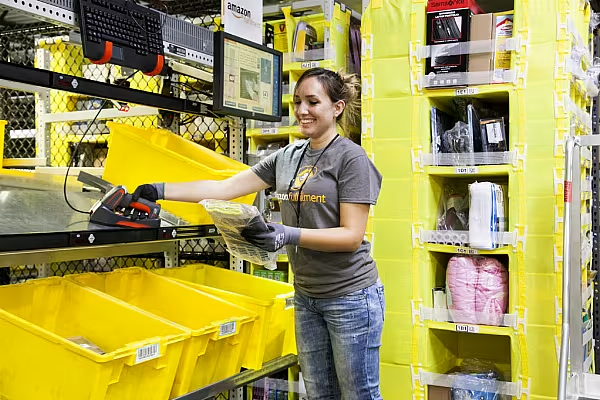Amazon.com Inc will only receive vital supplies at its US and UK and other European warehouses until 5 April, its latest move to free up inventory space for medical and household goods in high demand as a result of the coronavirus outbreak.
The change does not mean that Amazon will stop selling non-essential items like phone cases and toys for now, only that products may be more likely to run out of stock in the next few weeks or sellers have to ship the products directly to consumers themselves.
In a note sent to sellers on Tuesday, Amazon said it is seeing increasing online shopping demand from consumers.
As its household staples and medical supplies are running out of stock, it will prioritise certain categories in order to "quickly receive, restock, and ship these products to customers."
Essential Products
Amazon defined several categories as essential products that can continue shipping, including baby products; health and household items; beauty and personal care; grocery; industrial and scientific; and pet supplies. Books are included as well.
"We understand this is a change for our selling partners and appreciate their understanding as we temporarily prioritise these products for customers," Amazon said in a statement.
The company said the new protocol applies to both first-party vendors and third-party sellers. That suggests that the company is not protecting its own products.
The move follows Amazon's announcement it will hire 100,000 workers for its warehouses on Monday, as the Seattle-based giant is trying to meet growing online shopping need from people who stay home amid the coronavirus outbreak.
Less Ad Revenue?
The news may hurt demand for lucrative services that Amazon offers to merchants, like advertising.
Amy Roskelley, owner of Utah-based Health Beet, said she pays Amazon around $1,000 a month to promote her flatware products that help consumers portion their meals. Now that she can’t add inventory to Amazon’s warehouses, she plans to cut ad spend in half.
“It’s hard for me to justify spending money if I don’t have enough inventory to fill” customers’ orders, she said.
Roskelley is considering other ways to reduce her dependence on Amazon, too, whether shipping directly to customers or driving traffic to her own website.
"I have been concerned that they'll shut down Amazon’s warehouses and won’t ship out at all, and that would just devastate me," she said.
Challenges
Amazon has yet to indicate any such closures. Still, the months-long outbreak is posing challenges to the e-commerce giant's operations, from supply chain to deliveries, as the virus spreads from China to the rest of the world.
"Our factories just resumed production, but now we can't ship to warehouses until April," said Zengxie Pang, a China-based seller, "We are already seeing a rising demand for kitchen supplies and they will likely run out of stock, as well as other products people use when they're stuck at home."
Amazon's two-day shipping guarantee has in some cases slowed to up to seven-day delivery, Baird Equity Research analyst Colin Sebastian said in a note.
Tuesday's announcement aims to speed up the operation, at the risk of limiting the availability of non-essential items like electronics that typically are a big part of Amazon's business.
Shift To Other Marketplaces
"This change will likely force some third-party sellers currently dependent on Amazon to shift sales to other marketplaces (eBay, Wish, Walmart, Facebook Marketplace, etc.), or onto their own websites," Sebastian said.
Third-party sellers account for over half of the sales on Amazon. Amazon has been courting sellers to use its own fulfillment system, enabling many of them with faster delivery without the risks of sitting on inventories.
One consultant said the announcement landed as third-party sellers were grappling with economic uncertainty amid the outbreak.
Workers at bars, gyms, theaters and other non-essential businesses are furloughed to help contain the spread of the deadly virus and President Donald Trump on Monday said the U.S. economy may be sliding into recession.
"Sellers are rethinking their entire strategies for selling in 2020," said Chris McCabe, founder of Amazon seller consultancy ecommerceChris.com.














